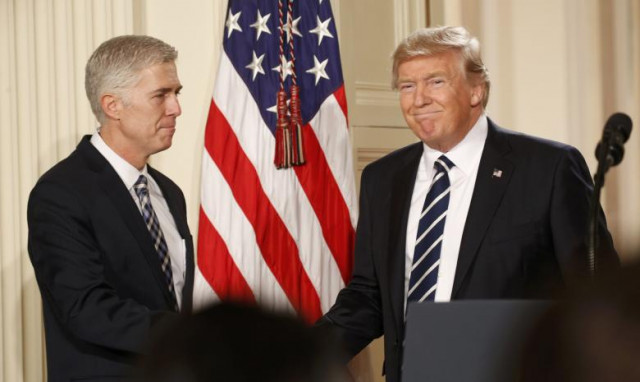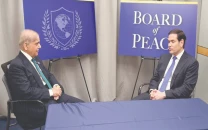Trump's Supreme Court nominee questions power of administrative agencies
Gorsuch is widely viewed as a sharp-eyed jurist and a crisp writer who has the potential to be a persuasive voice.

Supreme Court nominee Judge Neil Gorsuch is known for questioning how far courts should go in deferring to federal agencies on interpreting the law, a view that could be important for US companies and, perhaps, for President Donald Trump.
Nominated by Trump on Tuesday to fill a vacancy on the nation's highest court, the 49-year-old Gorsuch is widely viewed as a sharp-eyed jurist and a crisp writer who has the potential to be a persuasive voice on the court.
In a recent case, Gorsuch took a dim view of a landmark 1984 high court ruling, Chevron v. Natural Resources Defense Council. Widely cited, the ruling directed judges nationwide to defer to agencies' interpretation of laws that may be ambiguous. It is known as "Chevron deference."
Attorneys general from 16 states condemn Trump travel ban
Last August, in a case over immigration rules, Gorsuch called the doctrine the "elephant in the room" that concentrates federal power "in a way that seems more than a little difficult to square with the Constitution."
Showing his willingness to tackle the issue head on, he added, "Maybe the time has come to face the behemoth."
If Gorsuch can persuade other Supreme Court justices to question Chevron deference, companies arguing before the high court against federal regulations might have a better chance on issues ranging from the environment to immigration.
At the same time, broader skepticism of deference to agencies could have long-term consequences for Trump.
The new president is moving swiftly to reshape the federal bureaucracy, appointing agency heads who could upend the legacy of President Barack Obama on emissions, health care and internet policy. The court's views on agencies' agendas will be critical.
Trump travel ban could mean no bride, no wedding
"The idea that President Trump of all people would be the one to choose a justice who might push the court to reduce the executive power is pretty ironic," said John Nagle, a professor at the University of Notre Dame Law School.
If the Supreme Court were to overturn or limit the Chevron precedent, lower courts could become more active in deciding the ultimate meaning of a statute, making it less likely that an agency's view would stand, Nagle said.
"It could make it more difficult for the Trump administration to defend some of its regulatory actions in federal court," said Case Western Reserve University School of Law professor Jonathan Adler.
Republicans in Congress, particularly when Obama was in office, frequently complained about Chevron deference. They have even debated legislation that would override it. The House of Representatives passed such a bill on January 11, although it is unlikely to win approval in the Senate.
Gorsuch is not the first judge to take aim at the issue.
In 2015, the Supreme Court ruled against the Environmental Protection Agency over its regulations for limiting pollution from mercury and other toxic materials. At that time, conservative Justice Clarence Thomas wrote a separate opinion saying the government's position "raises serious questions about the constitutionality of our broader practice of deferring to agency interpretations of federal statutes."
International reactions to Trump's travel ban
While Thomas has argued the doctrine threatens the Constitutionally-mandated separation of the different branches of government, Chief Justice John Roberts and Justice Anthony Kennedy have said it may threaten individual liberties, said Andrew Grossman, a conservative lawyer who has represented companies challenging government regulations.
"Gorsuch may be the one to bring the court together on fundamental questions of administrative power that have sparked so much controversy and divisiveness in recent years," Grossman said.
Some court-watchers say that in practice the justices are inclined to support executive actions that are in keeping with their own views. But an analysis of their votes carried out by Jack Beermann, a professor at Boston University School of Law, showed that such an outcome is not uniform.



















COMMENTS
Comments are moderated and generally will be posted if they are on-topic and not abusive.
For more information, please see our Comments FAQ